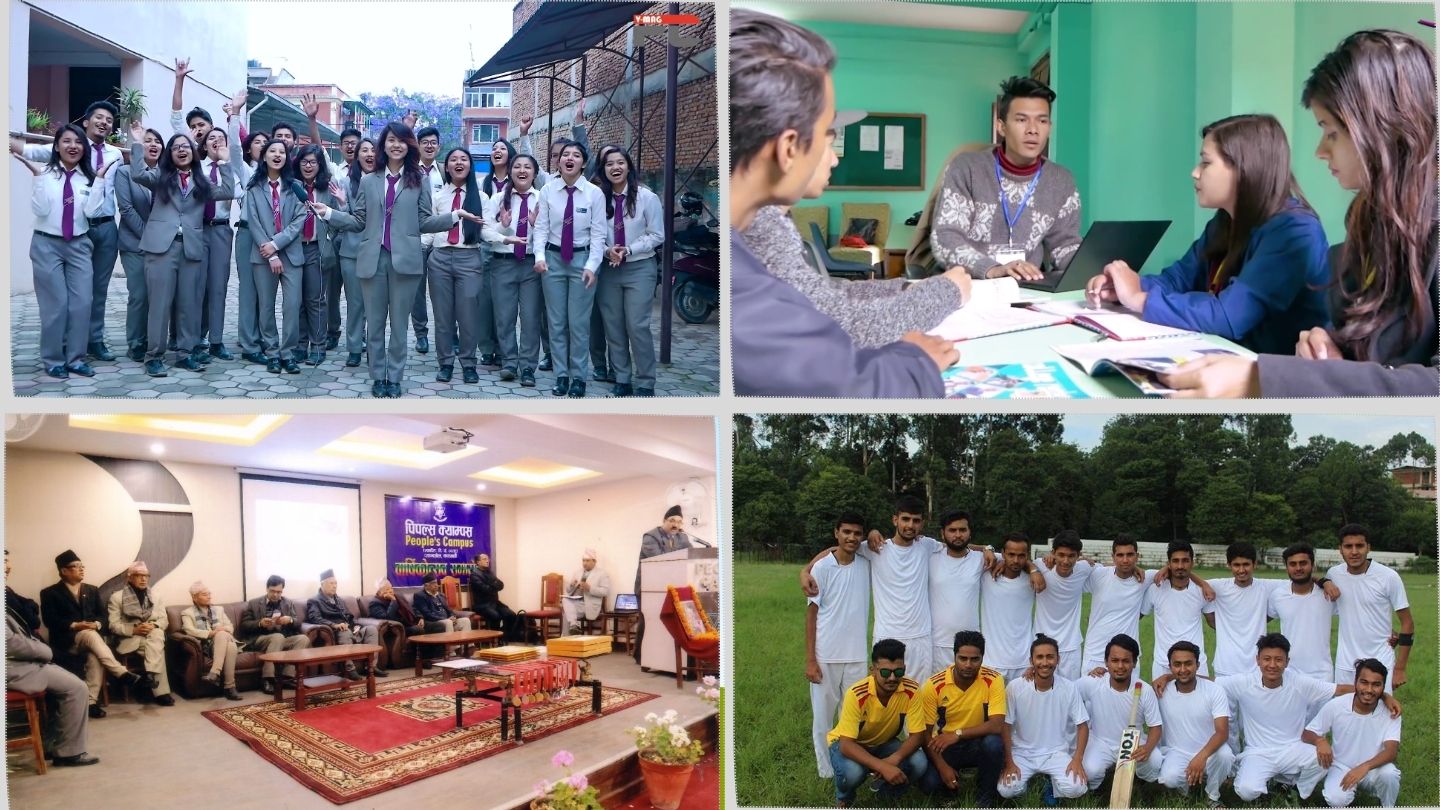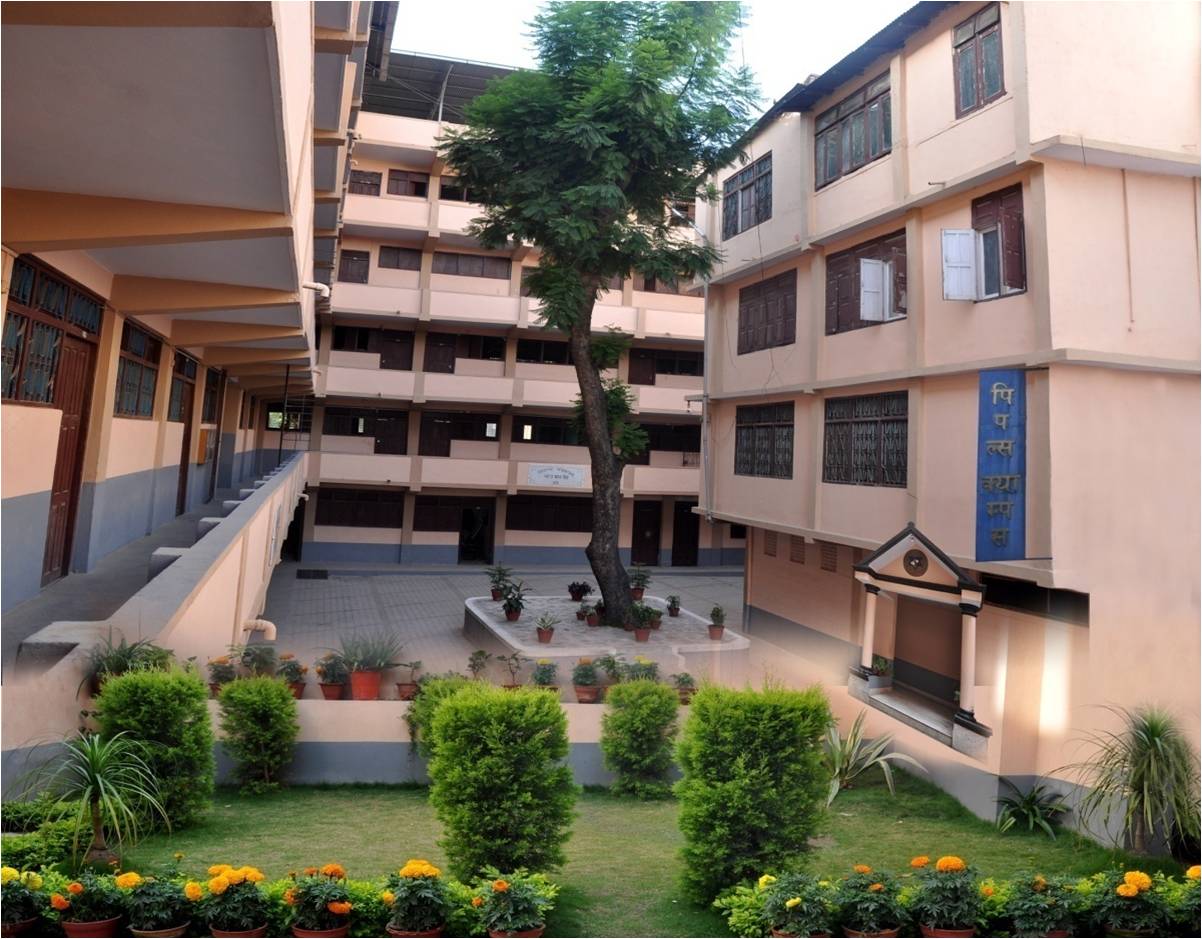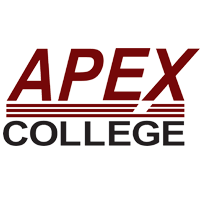Overview
People’s Campus is a community-based, non-profit institution in Paknajol, Kathmandu. Established in 1981, it serves learners from Ten Plus Two (+2) to postgraduate level under the National Examination Board (NEB) and Tribhuvan University (TU).
The campus operates 60+ classrooms, three computer labs, an e-library, and a well-stocked library, supporting more than 1,400 students each year. Programs include +2 Management, BBS, BBA, BBM, and MBS. Over the years, the campus has received Nepal Chamber of Commerce Excellence Awards and produced TU toppers, reflecting steady academic outcomes and a culture of consistent study.
Quick Highlights
-
Type and affiliation: Community-based, non-profit; TU and NEB
-
Year of establishment: 1981
-
Location and land: Central Kathmandu; main and annex blocks at Paknajol, with additional land at Sano Bharyang and Panchkhal
-
Student body: 1,400+ across +2, bachelor’s, and master’s levels
-
Current programs: +2 Management; BBS; BBA; BBM; MBS
-
Proposed programs: MBM; MBA
-
Facilities: 60+ classrooms; three computer labs; e-library (since 2017); library (~25,836 books and journals); auditorium (100+ seats); EMIS; CCTV; generator (10 kW) and solar; playground; cafeteria
-
Academic support: IQAC, Research Management Cell, job placement and counselling cell
-
Quality systems: Strategic planning since 2016; participation in QAA process under HERP
Introduction
People’s Campus was created by local educationists and community members to widen access to management studies at a fair fee. The main and annex buildings in Paknajol hold classrooms, labs, a library, an e-library, and an auditorium. Open spaces host outdoor activities and student gatherings.
Quality assurance runs through daily work. An Internal Quality Assurance Cell (IQAC) and a Research Management Cell (RMC) help the campus review courses, encourage research, and track improvements. Administrative and academic records flow through an Education Management Information System (EMIS). Security coverage includes CCTV.
Academic Programs Offered
Ten Plus Two (+2) Management — NEB
The +2 program supports students moving up from SEE to higher studies in management. Teaching combines classroom sessions, assignments, and regular assessments. Shifts run in the morning and day to suit student schedules.
Bachelor of Business Studies (BBS) — TU
-
Structure: Four years; annual examination
-
Focus: Business economics, legal environment, quantitative tools, research methods
-
Options: Specialization choices such as accounting, finance, management science, human resource management, and marketing
-
Outcome: A solid base for entry-level roles and a pathway to postgraduate study
Bachelor of Business Administration (BBA) — TU
-
Structure: Eight semesters; 120 credit hours
-
Focus: Core management subjects, ethical practice, and decision-making grounded in real cases
-
Outcome: Planning, analysis, teamwork, and communication skills for business settings or self-directed enterprise
Bachelor of Business Management (BBM) — TU
-
Structure: Eight semesters; 120 credit hours
-
Focus: Management, entrepreneurship, communication, operations, and change management
-
Outcome: Operational and managerial foundations through projects, presentations, and applied tasks
Master of Business Studies (MBS) — TU
-
Structure: Four semesters
-
Focus: Accounting, finance, marketing, organizational and strategic management, and research
-
Outcome: Preparation for roles in business, industry, public bodies, and NGOs/INGOs; a stepping stone for doctoral ambitions
Proposed Programs
-
Master of Business Management (MBM)
-
Master of Business Administration (MBA)
The proposed programs align with demand for advanced management study and will proceed as approvals and resources allow.
Admission Process
Steps
-
Application submission within the announced deadline
-
Entrance test where required (TU test or campus test)
-
Interview or counselling round for shortlisted candidates
-
Merit list and document verification
-
Enrollment and orientation
Eligibility
-
BBA / BBM
-
Minimum C grade in each subject of Classes 11–12
-
TU CMAT pass and campus interview
-
-
BBS
-
Minimum D+ grade in each subject of Classes 11–12
-
Campus entrance test
-
-
+2 Management
-
SEE or equivalent
-
-
MBS
-
Bachelor’s degree as per TU rules
-
Admission notices specify dates, seat capacity, and any updates each cycle.
Teaching Faculty and Learning Methodology
Faculty and development
Experienced faculty lead classes across all levels. Regular workshops and internal meetings help teachers update methods, map course progress, and reflect on classroom practice.
How classes run
-
Course plans and log sheets are used to track coverage and time on task
-
Lectures are supported by demonstrations, Q&A, group discussion, and student presentations
-
Extra classes run for learners who need closer support
-
Guest speakers share industry and subject insights
-
Student feedback informs faculty review and improvement
The goal is steady progress, clear expectations, and timely support.
Infrastructure and Learning Facilities
Land and buildings
-
Paknajol: Main and annex blocks with 60+ furnished classrooms and an open ground
-
Sano Bharyang and Panchkhal: Additional land reserved for academic use
Library and e-library
-
Library in the annex building with around 25,836 books and journals
-
Reading zone for group and individual study (about 30 seats)
-
Newspapers and periodicals available
-
E-library set up in 2017 for digital resources and database access
Computer labs
Three computer labs with networked PCs and projection facilities support practical sessions, data work, and presentations.
Auditorium
A hall with seating for more than 100 hosts orientations, seminars, workshops, and student events.
Power and connectivity
A 10 kW generator and a solar setup maintain essential services. EMIS supports academic and administrative workflows.
Safety and security
Seventeen CCTV cameras cover key areas. Monitoring is centralized in the Campus Chief’s office.
Sports and recreation
A campus playground and basic sports equipment support regular games and intra-campus activities.
Cafeteria and amenities
The cafeteria offers fresh, hygienic meals at student-friendly prices and is monitored for quality and cost. Boys’ toilets were upgraded in FY 2078/79. Additional services include changing rooms, a primary health care unit, a charter board, a grievance handling cell with a suggestion box, and a job placement and counselling cell.
Alumni
An alumni body exists and is being re-activated to improve mentoring, internships, talks, and placement links.

Student Life and Campus Experience
Student life blends coursework with practical exposure. Learners take part in:
-
Workshops, seminars, and talk programs
-
Group tasks and presentations that build confidence and clarity in communication
-
Student journals and writing activities that encourage research habits
-
Social service initiatives that connect study with community needs
The atmosphere is calm and study-oriented, with faculty available for guidance and extra sessions when required.
Extracurricular Activities (ECA)
-
Sports on the campus ground according to the timetable
-
Clubs and student groups that host talk sessions, quizzes, and business idea sharing
-
Alumni and industry interactions for career awareness
Participation is encouraged so students can balance study with personal growth and teamwork.
Scholarships and Financial Support
BBS admission scholarships
-
A+ (≥ 90%): 60%
-
A (80%–89.99%): 30%
-
B+ (70%–79.99%): 15%
-
B (60%–69.99%): 10%
BBM admission scholarships
-
A+ (≥ 90%): 30%
-
A (80%–89.99%): 15%
-
B+ (70%–79.99%): 10%
-
B (60%–69.99%): 5%
BBA admission scholarships
-
A+ (≥ 90%): 30%
-
A (80%–89.99%): 10%
-
B+ (70%–79.99%): 5%
Additional provisions for BBS, BBM, and BBA
-
Semester toppers: monthly tuition fee waiver for the top student in each semester
-
People’s Campus loyalty: +5% for students who completed +2 at the campus, added to the applicable admission scheme
Scholarship seats are limited and follow campus policy. Applicants should check the latest notice for each intake.
Achievements and Institutional Milestones
-
Community service since 1981 with a focus on access and steady learning outcomes
-
Nepal Chamber of Commerce Excellence Awards across different years
-
TU toppers in BBS and MBS
-
Participation in HERP and the QAA process
-
IQAC and RMC supporting review cycles and research engagement
-
EMIS adoption and e-library expansion for academic and administrative workflows
-
Strategic planning in practice since 2016, developed through workshops, meetings, and focused group discussions
Why Choose This Institution?
-
Community model and fair fee structure
-
Clear study pathway: +2 → bachelor’s (BBS/BBA/BBM) → master’s (MBS)
-
Learning resources: 60+ classrooms, three computer labs, library and e-library, and an auditorium
-
Study culture: presentations, group tasks, seminars, and extra classes
-
Quality mechanisms: IQAC, RMC, EMIS, and regular planning cycles
-
Student support: CCTV coverage, basic health unit, grievance handling, counselling and placement services
-
Recognition of merit: admission scholarships, loyalty benefits, and semester-topper waivers
Conclusion
People’s Campus offers a calm and structured space to study management in the heart of Kathmandu. Programs span +2 to master’s level under NEB and TU. Facilities are in place, support systems are active, and scholarships reward effort. For learners and families seeking consistent study with clear rules and a community focus, this profile sets out what the campus provides and how it works.
Contact People's Campus's administrative office for detailed information on the course, admissions, location, fees, scholarships, facilities, counseling, or eligibility
Contact Address
Location: Paknajol Marg, Kathmandu, Nepal
Phone: +977-1-4251412, +977-1-4251990
Email Address: info@peoplescampus.edu.np
Website: www.peoplescampus.edu.np




















You need to login to comment.